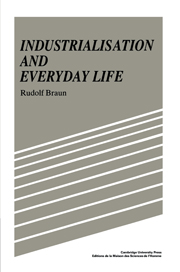Book contents
- Frontmatter
- Contents
- Prefaces
- Acknowledgements
- Note on measures and coinage
- Introduction
- 1 The preconditions for industrialisation
- 2 Changes to the structure of family and population in the industrial regions
- 3 Life and society of the population engaged in industry
- 4 The impact of industrialisation on the house and the rural economy
- 5 Work in the putting-out industry and its effect on the life of the common people
- 6 The outworkers' attitude to poverty and crises
- 7 Conclusion
- Postscript
- Appendix: a note on the administrative structure and social stratification in the countryside of Zurich during the Ancien Régime
- Notes
- Sources and bibliography
- Index
Postscript
Published online by Cambridge University Press: 16 March 2010
- Frontmatter
- Contents
- Prefaces
- Acknowledgements
- Note on measures and coinage
- Introduction
- 1 The preconditions for industrialisation
- 2 Changes to the structure of family and population in the industrial regions
- 3 Life and society of the population engaged in industry
- 4 The impact of industrialisation on the house and the rural economy
- 5 Work in the putting-out industry and its effect on the life of the common people
- 6 The outworkers' attitude to poverty and crises
- 7 Conclusion
- Postscript
- Appendix: a note on the administrative structure and social stratification in the countryside of Zurich during the Ancien Régime
- Notes
- Sources and bibliography
- Index
Summary
Rudolf Braun's work on the social and cultural impact of cottage industry in the canton of Zurich before 1800 belongs to a group of studies which appeared around 1960 and opened the field of regional studies in social and economic history. A common feature of them was their stress on structures and processes bearing on the lives of the great mass of ordinary people, such as the family, demography, work conditions, popular culture and mentality. All were usually based on a detailed scrutiny of primary source material available for a limited regional context.
Whereas in France the Annales movement paved the way for this new paradigm and the Anglo-Saxon community itself had a long-standing heritage in social and economic history, such a background was lacking in German historiography. Hence, it is of little surprise that Rudolf Braun's Industrialisierung und Volksleben has many of its roo'ts outside historiography and, as the reader will note in the Introduction, rather in the specific Swiss academic tradition of Volkskunde (folklore). Thus, while being in general a study in the history of mentality, this work nevertheless stands outside the corresponding tradition initiated by French writers. However, it does not merely form an application of concepts derived from Volkskunde, but breaks new ground by focussing less on cultural tradition (as was the usual approach of the discipline) than on cultural change and innovation associated with the emergence of industrial structures.
As a consequence of its unique background this study, despite its academic popularity, has tended to remain outside the mainstream of social historical writing.
- Type
- Chapter
- Information
- Industrialisation and Everyday Life , pp. 188 - 192Publisher: Cambridge University PressPrint publication year: 1990



